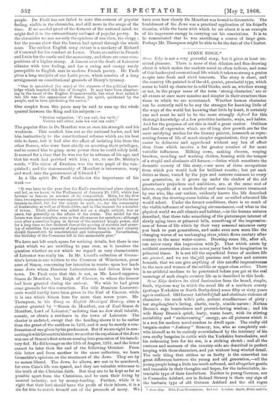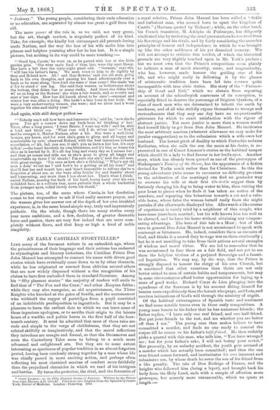STONE EDGE.*
Stone Edge is not a very powerful story, but it gives at least un- mixed pleasure. There is none of that dilution and fine-drawing about it which makes the modern novel so often tedious, and none of that hackneyed conventional life which it takes so strong a genius to spin into fresh and vivid interests. The story is short, and the country life painted is of the old, quaint, provincial type, which seems to build up character in solid blocks, such as, whether strong or not, in the proper sense of the term 'strong character,' are at all events at once more massive and simpler in their structure than those to which we are accustomed. Whether human character can be correctly said to be any the stronger for knowing little of the ways of the world but knowing that little by heart, it certainly can and must be said to be the more strongly defined for this thorough knowledge of a few primitive instincts, ways, and habits. And for the purposes of art this is itself a great matter. Outlines and lines of expression which are of long slow growth are far the most satisfying studies for the literary painter, inasmuch as repre- senting forms of life of much simpler organization, they are much easier to delineate and apprehend without any loss of effect than those which involve a far greater number of far more variable influences. Milking cows, making cheeses, reaping bracken, mending and washing clothes, bearing with the temper of a stupid and obstinate old farmer,—duties which constitute the domestic scenery of this story, —are none of them occupations from which you would look for brilliant results ; but yet such duties as these, varied by the joys and sorrows common to every new generation, as it grows up under the shadow of the old generation's prejudices and ambitions, are, at the same cost of labour, capable of a much fresher and more impressive treatment by one who, like our author, evidently knows the life described well, than the drawing-room habits of our so-called educated life would admit. Under the former conditions, there is so much of the visible influence of unchanging circumstances,—of what in the physical world we call climate and habitat,—in the human natures described, that these take something of the picturesque interest of slowly aging trees or primeval hills, something of the impressive- ness of forms of life which by their very seasonal sameness carry you back to past generations, and make even men seem like the changing waves of an unchanging river which flows century after century in the same water-course. Drawing-room life, after all, can never carry this impression with ;it. That which exists by artificial convention alone can never carry back the imagination to primeval times. It is not till the superficial forms of modern life are pierced, and we see the:old passions and hopes and sorrows beneath, that we can give anything of this natufal impressiveness to the men and women of the middle or upper-class salons. There is no artificial medium to be penetrated before you get at the real meanings of such simple country life as is described in this book.
Stone Edge derives its chief fascination from the broad, simple, fresh, vigorous way in which the usual life of a northern county (perhaps Yorkshire or North Derbyshire) some fifty or sixty years ago is outlined. Old farmer Ashford's:dull and obstinate violence of character ; his meek wife's pale, patient steadfastness of piety ; her stepdaughter's loving, elastic, ready, nimble nature ; Nathan Broom's sage benevolence and proverb-loving wisdom ; and his wife Bossy Broom's quick, hasty, warm heart, with its stirring sociability and " endeevouring " energy, are all pictures which it is a rest for modern novel-readers to dwell upon. The crafty old bargain-maker " Joshuay " Stracey, too, who so completely out- wits himself as to be entirely overwhelmed by the intricacy of his own crafty bargains in cattle with the Yorkshire horsedealers, and his redeeming love for his son, is a striking sketch ; and all the customs and manners of the country-side are described in perfect keeping with these characters, and yet without long-winded detail. The only thing that strikes us as faulty is the somewhat too great difference between the young and old generation,—all the young people being a little too much softened, and altogether gentle and tameable in their thoughts and hopes, for the indomitable, in- tractable type of their forefathers. Neither in young German, nor in Cassandra Ashford, nor in Roland Stracey is there any sign of the barbaric type of old German Ashford and the old rogue * Stone Edge. With Four Illustrations. In 1 vol. London: Smith, Elder, and Co.
" Joshuay." The young people, considering their rude education or no education, are separated by almost too great a gulf from the old.
The mere power of the tale is, as we said, not very great, but the art, though modest, is singularly perfect of its kind. Take, for example, the kindly but circumspect old proverb-loving uncle Nathan, and the way the loss of his wife melts him into piteous and helpless yearning after her he has lost. It is a simple picture, but nothing in its way could be more touching :—
" 'Good bye, Cassie,' he went on, as he parted with her at the little garden gate. She were main fond o' thee, lass, were thy aunt Bossy. Her have a left thee the sixty-eight pund odd. "Gorman," says she, " will has his father's farm." We mun trust to him to do rightly by thee and Roland now. Ah ! and thae flowers,' said the old man, going back to his own thoughts, and passing his hand affectionately over a bush as he wont along, 'how fond she were o' time roses ! She made 'um a' for to stand o' one leg. She said they werena so bothersome about the bottom, they didna hae so many rucks. And there she didna bide wi' us sa long as the flowers ! she were a fair wench, and so seemly and neat a' her days. How hur did knock about to be sure !—summer and winter hur was allus a doing. She hadn't a lazy bone in hur body. She were a very endeevouring woman, she were ; and we niver had a word together for nine-and-thirty year.'"
And again, with still deeper pathos
'Nobody can't tell how bare and lonesome it is,' said he, now she bo gone. I've got a sorrow down my back-bone wi' thinking o' her.' Then, after a long pause, I want Bessie, I want my wife !' said he, with a loud and bitter cry. 'What iver will I do wi'out her !'—' You'll mebbe overget it, Master Nathan, after a bit. She were a well-livin' 'ooman, yer know, and for sure she's gone to glory, and all happy and comfortable by now,' observed Roland, with the best intentions towards consolation.= Ali, lad, you see, it ain't you as have a lost her, it's easy talkin' ;—the heart knoweth its own bitterness, and it's him as wears the shoe as is hurted by it. It's all day long and every day as I misses her ; and then ye comes and tells me as she's gone to glory all happy and comfortable up there i' th' clouds ! I'm sure she ain't,' said the old man, with great energy. I'm sure as how she's a thinking,' " What's my old man a doin' wi'out me ? and how's he a getting on all his lone?" and that'll fret her and worrit her ; and 'tain't reasonable to tell me she've a forgotten a' about me, as she were allus fottlin' for and bustlin' about and humouring, any more than I has about her. That's what I think,' ended Nathan, passing the back of his hard, horny band over his own wrinkled face, as a solitary tear, more pathetic than a whole bucketful from younger eyes, rolled slowly down his cheek."
The picture, too, of the scene where Cassie, in her desolation comes to her stepmother to ask if God really answers prayer, and the woman gives her answer out of the depth of her own troubled experience, is, in the same broad simple way, truly and impressively pathetic. On the whole, though there are many stories every year more ambitious, and a few, doubtless, of greater dramatic force and passion, there are very few indeed that are more com- pletely without flaws, and that keep so high a level of noble simplicity.



































 Previous page
Previous page